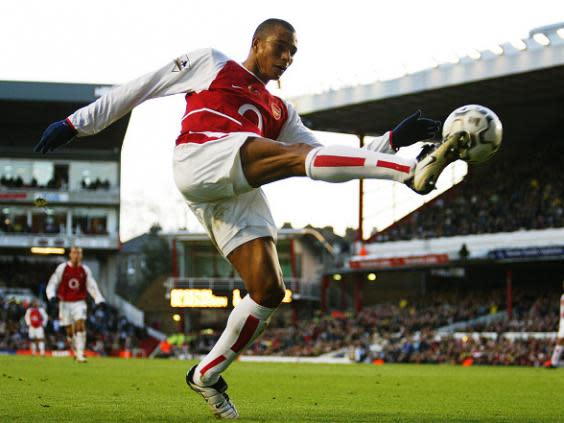Premier League 100: Arsenal’s invisible Invincible Gilberto Silva mastered shadows so others could gleam
In a glittering midfielder that combined the attacking grace of Robert Pires and Freddie Ljungberg and the talismanic destruction of Patrick Vieira, it’s to little wonder that Gilberto Silva became the forgotten turret of Highbury’s Rushmore. A player of simple silk and simpler beginnings, the unsung anchor at the core of one of the Premier League’s greatest sides; ‘The Invisible Invincible’.
An indiscriminate colossus, it was only by way of Emerson’s misfortune, after Brazil’s captain suffered a freak shoulder injury in training, that Silva was involved in the Selecao’s triumph in South Korea. A bulky midfielder of little flair and subdued ego suddenly thrust into a side that would compound the angst and aspiration of England’s golden generation, playing guard dog as Ronaldinho enchanted the globe en route to Yokohama glory.
Embroiled in a dispute over unpaid wages at Atletico Mineiro, Silva’s robust technicality enticed Arsene Wenger and the midfielder was snapped up for a paltry £4.5m. Still, the more blinkered sceptics questioned whether the South American star would have the necessary grit and physicality to withstand the tides of the Premier League.
But it was in that dogged role, a centre-back transitioned into midfield, that Silva became an understated and unassuming jewel in Arsenal’s crown, overseeing the 49-game unbeaten streak and two FA Cup triumphs. A tenacious fulcrum, happy to dominate the shade as others gleamed. “I am always comfortable doing the hard work in the middle,” Silva said, as he prepared to depart Arsenal after six years at the club. “For me, it is an honour. It’s what I was made to do.”
When Silva arrived at Arsenal, taken under the nurturing wing of compatriot Edu, his impact was instantaneous, a necessary disruptor within an irresistibly fluid side, freeing Vieira to gallop forward. In Brazil, he was anointed the “piano carrier” - the conductor who allowed those in front to create music. Just 20 minutes into his Arsenal debut, in the Community Shield against Liverpool in 2002, Silva struck the winner. Soon he had usurped Edu and become the side’s lynchpin.
READ MORE: Ceferin and FA condemn ‘abhorrent’ racist abuse of England players
READ MORE: The rise and rise of Raheem Sterling
But away from the field, the transition to London was tough for a player so unpretentious. Upon arriving, he claimed, “London is too big – I confess that I am afraid to be in the city,” eventually finding comfort in playing his mandolin at a local pub in St Albans on Thursday’s music night.
The glimpse of vulnerability highlights a surreal side of Silva. A boisterous player, almost a contradiction within a pool of expressionists, with few singular highlights or spectacular spells to define his legacy in a team which refined modern football in England.
His 276 appearances instead characterised by a flurry of physicality and denial of showmanship. A recycler who rarely lingered on the ball, a sweeping pit stop from defence to attack, in many ways a foreshadowing of today’s definition of the ball-playing centre-back.

Silva was an integral member of Arsenal’s unbeaten side, featuring in 32 of 38 games, his tireless industry slowly garnering admiration. The following season, after unknowingly starting the campaign with a fractured back that would threaten to end his career prematurely, he returned in time to help Arsenal suffocate Manchester United in the FA Cup final in 2005, before reimposing his barricade in front of a makeshift defence, featuring Philippe Senderos, Emmanuel Eboue and Mathieu Flamini, en route to a record-breaking 10 Champions League clean sheets and the final in 2006.
READ MORE: Premier League 100 - Countdown to the best 100 players in the Premier League
Still acknowledged better by the side’s weakness in his absence rather than the ubiquity of his commandeering presence, Silva became a leader during Arsenal’s mass exodus, as well as captaining Brazil to victory in the Copa America.
Eventually, though, the years of domineering would sap the energy from his legs, allow his frame to lumber, until he steadily regressed to the statesman role of dressing room influencer within the squad. By the time he departed the Premier League in 2008, playing his last game well before the season’s close, he did so with relative anonymity, a player who’d given everything to Arsenal and left with little fanfare. Typically understated, best adulated in his absence, evidenced no better than by the series of players since who have failed to wear his shadow.

